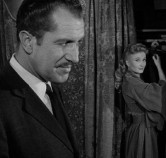Movie Review: MARTHA MARCY MAY MARLENE (2011)
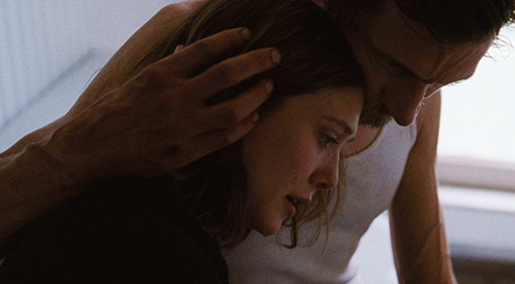
Away From Herself...
Martha has been gone for a very long time. The one who took her place was a much more gullible and subservient young woman named Marcy May. It cannot be denied that she was very happy in her dazed, obedient bliss. To obtain this, she had to stretch her mind wide open for Patrick – her teacher, leader, and lover. This fifty-year-old man renamed her. “Marcy May” sounds more rustic and appropriate for her to stay in the Catskill Mountains, an unspoiled plantation that Patrick rules. It is the promise of this open land that awed the first settlers of America. Martha seeks this promise, lives the dream, and eventually wakes up trapped inside of a nightmare.
The movie begins as Martha (Elizabeth Olsen) escapes the cult one day. The fragments of her original identity are scattered and lost in the recesses of her molded mind. Upon further reflection of writer-director Sean Durkin’s insidious character study Martha Marcy May Marlene (2011), it is a miracle that she even remembers the phone number that belongs to her older sister, Lucy (Sarah Paulson). Martha takes refuge in a small town that she could not place on a map. A visual tell that grounds us geographically is an American flag drooping in the cold, which is seen out of focus behind Martha as she makes that pay phone call.
After a three-hour drive, Martha settles in a large vacation home that belongs to Lucy and her well-to-do husband, Ted (Hugh Dancy). Instead of a member of the family, she feels like a visitor. Some families don’t know how to go beyond the polite obligation of having to take in one of their own. Martha suffers greatly from existential angst as well as guilt, depression, confusion, and bottles up a deep rage she cannot direct. Lucy is torn between concern and irritation. After all, Martha is so irresponsible to have gone off the map for two years without calling. Surely, she must have had a ball while shirking off college along with her future opportunities.
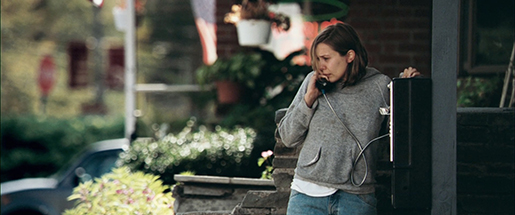
Ted is polite, but lapses when he passive-aggressively notes that this is supposed to be his vacation. He doesn’t want to be bothered with a family crisis. One of the key confrontations in the movie takes place between Martha and Ted at the dinner table, regarding her plans for the future. She doesn’t know what she’s going to do and just wants to be left alone. Ted presses her about “adult life.” Martha asserts that there are more alternatives to life than having a career. If he’d like to go abroad and live a carefree existence, then what’s stopping him? Martha tells him, “It’s not your fault that you measure success with money and possessions. It’s just not the right way to live.”
Ted cannot believe this aimless, unwelcome interloper living under his roof has the nerve to criticize him. Condescendingly, he lectures her about personal responsibility and paying for their livelihood. Does she have any values at all? What is so vital and thrilling about this scene is that Martha is rebuking the demands of the American Dream? She is free to succeed or fail at securing happiness just so long as she goes with the program. Martha refuses. Therein lies the irony that she really isn’t free to find an alternative lifestyle that breaks away from contemporary society’s laid-out route. What makes this even richer is that a brainwashed cult member accuses a taxpayer that he is the one that is indoctrinated by national mind control.
Martha has a point. Durkin refuses to cater to his audience by declaring one character as the one in the right. Such a debate when treated seriously will result in a troubling paradox far removed from a reassuring message.
The tragedy that awaits free spirits like Martha is that the promise of a better life outside of national restraints is bound to be even more exploitive and corrupt than the existing one. Without safeguards like the law and a community that is connected by their government, Martha has the rug pulled out from under her doomed existence. If Martha had read Richard Yates’ Revolutionary Road, she would have found a literary soulmate with April Wheeler, a 1950s housewife who suffered from following the rules of domestication and failing to live out her dreams.
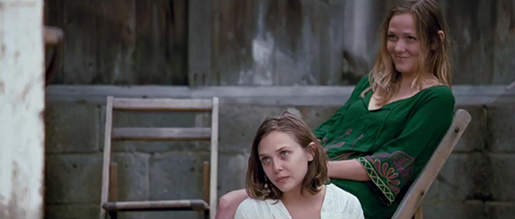
At one point, Lucy feels pangs of guilt. She admits that she wish she had taken better care of Martha – making sure she went to college. “You had so much potential,” she says. Had? Martha looks to be in her early twenties and Lucy talks as though it’s too late for Martha. There is so much pressure to succeed that to stray from academia for a few years appears destructive. It is the fear of going after the American Dream that compelled Martha to follow Watts (Brady Corbet), a so-called lover who seduced her into joining the cult. Watts provided an escape from the anxiety of a lockstep path to achieving happiness on her family’s terms.
The main intent of the American Dream is that anyone can recreate his or her identity. That is what the dangerously charismatic cult leader Patrick (John Hawkes) does for Martha. Reborn as Marcy May, she piously serves his will. He even serenades her with a song that reduces her to being “…just a picture that hangs on my wall.” It is a chilling scene on a par with Keith Carradine seductively singing “I’m Easy” from Nashville (1975). She performs menial labour and even learns how to garden well in order to be sheltered and taken care of. Patrick has relieved Marcy May of thinking for herself. The cult deprives her of liberty, but she is suspended in a perverted state of bliss. It is important to note that this has happened before she is rationed to one meal a day and drugged into an obedient stupor.
Durkin doesn’t let Martha off the hook, though. As a character, her personal responsibility is regarded as a major factor in the story. Most filmmakers would use this scenario to establish her as a complete victim and disregard her as a flawed human being. Martha is depicted as a three-dimensional character who doesn’t stop at being victimized. This makes revelations even more chilling, such as Martha later drugging and molding young women who follow her as ‘the new girl’. Martha is so far gone that she cannot recognize the evil she inflicts, nor the outrage that the same crime had been done to her. More troubling still is when Martha tells her sister, “I am a teacher and a leader. You just never let me be that, but now I am. I know who I am.”
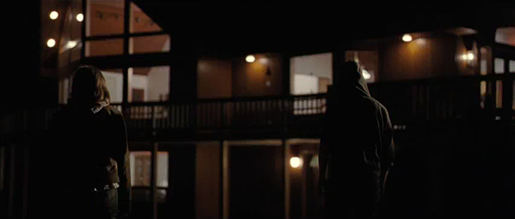
The cult comes across as a hippie commune depicted in Arthur Penn’s Alice’s Restaurant (1969) that has gone very wrong. The snake charmer Patrick has a passing resemblance to Charles Manson, another cult leader who was based in California during the late 1960s, but just as manipulative and murderous. It appears that Durkin is turning a very cynical eye towards the period that America’s youth came closest to a revolution that promoted peace and love. Had we given the flower power even more time to grow, it might turned as sour as Patrick’s commune in the Catskills. Still, Martha might have been happier as a part of that Swingin’ Sixties generation before disillusionment struck.
In one scene, Martha is lounging with Lucy in the expansive backyard that overlooks a lake. The location and the economy of shots feels right at home with one of Éric Rohmer’s Moral Tales like La Collectionneuse (1967)* and Claire’s Knee (1970), however, the increasing chill of the wind brings to mind the extremely creepy François Ozon thriller See the Sea (1997). Martha wants to swim. Before her sister and anyone else out there, Martha strips nude and nonchalantly dives into the lake for a swim. Lucy notices and demands Martha get out of the water and dressed. “We don’t do that kind of thing. Get out!” Back in civilization, Martha is restricted. At the cult, Martha was encouraged to lose her inhibitions along with vanity and personal privacy.
One of the greatest condemnations Durkin makes is that society is so grossly dominated by men. Martha doesn’t seem to mind very much that she is entering a much smaller social order where the men act like complete overlords. The onslaught of women being depicted submissively through advertising and men holding so many positions of power has ultimately failed women like Martha who lack the perception to see proverbial red flags. In a society where women are regarded as subhuman, it is no wonder Martha slips down into the trance of cult worship.
Who is Marlene? It’s all the lost women who answer the phone as one and as none.
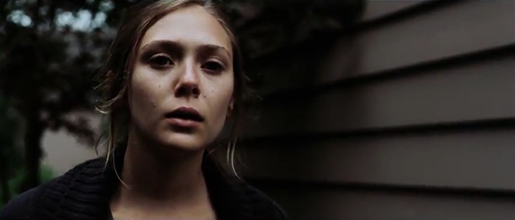
What breaks the spell occurs in a shocking episode where Martha and the cult members are caught looting a house by a homeowner. To her horror, Patrick gives the command and the man is stabbed to the death; the reverie is broken. It was not due to the grave atrocities committed to women from the world over that are performed in the cult. Young women are enslaved and dressed in cheap white dresses like African-American slaves forced to work the plantations before the Civil War ended. They even have to wait for the men to eat first and scrape whatever is left in the dinner bowls. Martha informs Zoe (Louisa Krause), a new cult member, that the babies sired by Patrick are all boys. One cannot help but imagine that there is a forbidden section of the land where baby girls are buried in secret from the women. Martha’s conscience is bothered because she can’t stop thinking about that man’s brutal demise.
There is a good question about whether Martha knows about cults at all. Does she even know who Charles Manson is? Is she simply ill-informed or is it willful ignorance? The same question could be asked of both Lucy and Ted. Unlike Paul Thomas Anderson’s The Master (2012), which reserves the use of the word “cult” only once, however, nobody in Durkin’s film says it at all. Perhaps Martha lacks the vocabulary necessary to understand and even save herself from being initiated in an extremist mind-controlled group. That is a searing indictment of the American education system that leaves young people defenseless. Does she know who Charles Manson is? If she had been warned about cults, maybe she never would have joined.
Neither Lucy nor Ted comes to the realization that Martha was held captive by a cult. Perhaps they are very reluctant to admit that something so horrible could touch their family. Thoughts like that are the stuff of nightmares. Are they not successful in the land of opportunity? Did they not follow the rules? The ominous cloud of cults is regulated for people they will never meet, but encounter briefly as sad cases on the evening news. Lucy and Ted are untouchable, right?
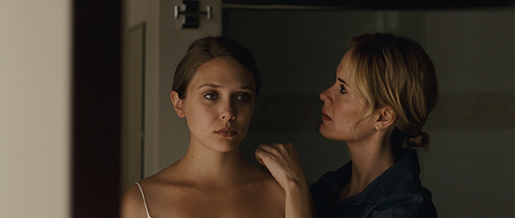
Lucy and Ted, standing in for society at large, are implicit in ways they are similar to the cult. Both parties infantilize Martha. The cult controls Martha like a child. Even Watts attempts to scare Martha in leaving a public diner with him by going outside like a father pretending to strand her. When Martha attempts to curl up with Lucy and Ted during sex, she is chastised. Now that shameful boundaries have been smoothed out of her head, Martha is left to awkwardly repeat after Lucy that “it’s private and not normal.” Ted holds himself above Martha like he was her superior. Another startling scene shows Lucy and Ted sedating Martha with drugs just as she has a sudden meltdown at their barbecue party. Like the cult, they’d rather keep her quietly out of the way than deal with her.
Our sympathies towards Martha are outstanding, yet complicated. She was content with the cult, but suffers her inability (or is it her reluctance) to realize what she has become of her. This movie peers fearlessly into the abyss, which is reflected in Martha’s eyes at times. We feel for her, but she is genuinely dangerous to everyone around her.
Durkin handles such slippery issues by using ambiguity to further disturb the viewer. Martha has just cause to be paranoid by the looming threat of the cult members breaking into the vacation home to do unspeakable things to everyone inside. Perhaps Patrick could once again brainwash Martha, his personal favourite, by getting her to shoot a bound-and-gagged Ted dead. Back in her cult days, Martha was reluctant to shoot kittens, even when Patrick told her to. However, Martha’s confusion and rage towards Ted could be what sets her off. To sweeten the deal, Patrick could have Lucy brought along back, chained and impregnated, for Martha to play “teacher and leader” to her. All of this is speculation, which is to Durkin’s credit for setting up such a grim scenario to ruminate about. The ultimate conclusion to this American masterwork is as harrowing as it is inexplicable.
*Come to think of it, confusing the Rohmer film with The Collector (1965) by William Wyler would be apt.
Scene: “Just Because We’re Sisters”
When Martha calls the compound to talk to Zooey, why does “Marlene” sound so much like Martha? In a sense, Martha is still trapped in the compound. And she always will be.

MARTHA MARCY MAY MARLENE (2011) Trailer
MARCY”S SONG sung by John Hawkes

“Did you ever have that feeling where you can’t tell if something’s a memory or if it’s something you dream?”

“If you trust me, and I hope you do, then you will let me in.”
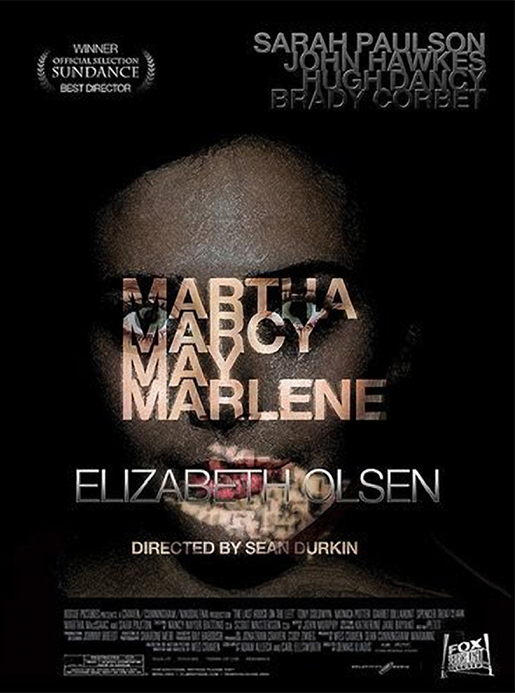
© 2008 – 2024, CINELATION | Movie Reviews by Chris Beaubien. All rights reserved.

















